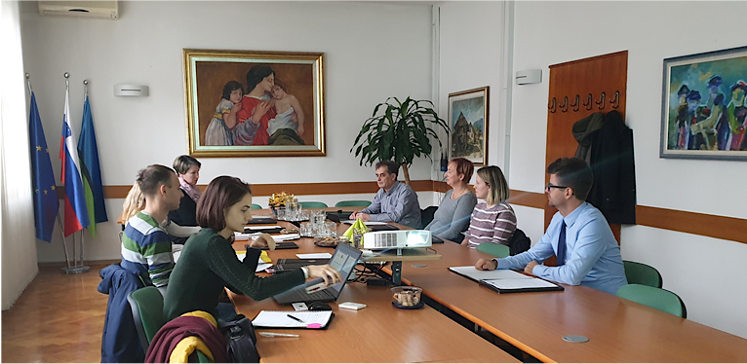Maturity Assessment Process - Slovenia
The organisations responsible for the self-assessment process are:
• the Social Protection Institute of the Republic of Slovenia
The region
The Municipality of Trbovlje, in central-eastern Slovenia, is home to more than 16,000 citizens. The Slovenian healthcare system is largely financed by compulsory healthcare insurance with the only provider the Health Insurance Institute of Slovenia. There has been a focus on regulation and integration of long-term care for sometime, however it is not systematically regulated. The Ministry responsible for social affairs has already identified several weaknesses of the existing system in the National Report on Social Protection and Social Inclusion Strategies 2008-2010, including: existing services and benefits are not integrated into a single system; poor coordination between services providing different services, impedes access to services and diminishes their quality; users are not always given equal access to quality services and many times services are not meeting their needs.
In 2017, the Ministry of Health took over the preparation of the law. With the aim of finding better solutions, pilot projects are currently underway in Slovenia to test new services and the new way of organisation of long- term care delivery.
Maturity Assessment for Integrated Care
The maturity assessment process was fully conducted in and comprised two stages:
- Individual self-assessments, completed by each of the selected stakeholders separately; and
- Face-to-face workshop with an objective to reach the consensus among all participating stakeholders on the final level maturity of their organisations, regions and countries for integrated care.

Strengths identified through the Maturity Assessment process
- Digital Infrastructure
- Structure & Governance
- Breadth of Ambition
Weaknesses identified through the Maturity Assessment process
- Process Coordination
- Population Approach
- Evaluation Methods
Stakeholders assessed that the maturity for integrated care in Municipality of Trbovlje is low. Readiness to change needs to be addressed as a priority for knowledge transfer and improvement activities planned for the SCIROCCO Exchange project. The Stakeholders see this dimension as a starting point of transformation towards more integrated health and social care delivery in the Municipality of Trbovlje. The attendees of workshop provided important insights about current state of long-term care in Municipality of Trbovlje.
The Stakeholders observed some connections between the dimensions of the SCIROCCO Maturity Model. There is a connection between the dimensions "Removal of Inhibitors" and "Capacity-building".
Stakeholders pointed out that a lack of trained staff presents a big obstacle for the implementation of integrated care. Also, while it is important to highlight strengths such as Digital Infrastructure and Digital Services, there is still room for improvement, for example, better and more systematic organisation of ehealth capacities.
The Stakeholders decided to take an initiative to employ a social worker, who will become a part of multidisciplinary team of professional in the regional hospital.
Also, stakeholders concluded that the social and health sector should be more collaborative, and have decided to run regular meetings for all important decision-makers in the field of long-term care.
Findings of the projects like SCIROCCO Exchange should be taken in account when preparing new law regarding long-term care.
The spider diagram illustrates the outcomes of the final consensus on the maturity for integrated care in the Municipality of Trbovlje, Slovenia.

The final report which will provide much more detailed information about the region and the process is available to download in the Maturity Assessment Reports section in Resources.


The project SCIROCCO Exchange is co-funded by the Health Programme of the European Union under Grant Agreement 826676 (Chafea)


